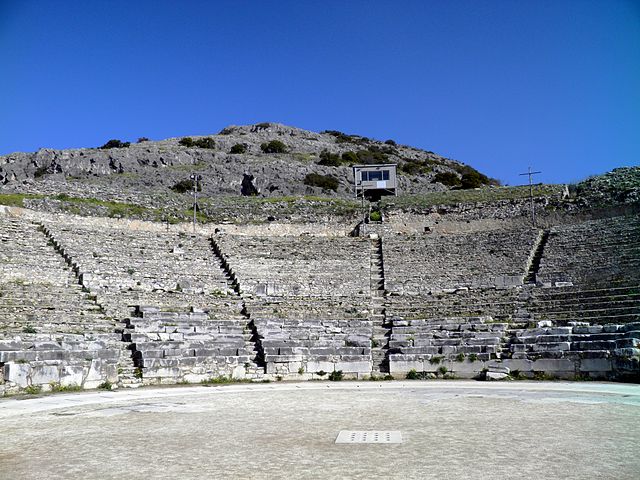
Ancient Theatre in Philippi, built by Philip II in the 4th century BC. Photograph by Carol Raddato (4-7-12) [Wikimedia Commons / Creative Commons Attribution-Share Alike 2.0 Generic license]
***
(1998)
*****
This is the Greek word martus, from which is derived the English word “martyr.”
1) Greek-English Lexicon of the New Testament (Joseph H. Thayer, Grand Rapids, Michigan: Baker Book House, 4th ed., 1977; orig. 1901, 392) defines it — as used in this verse — as follows: “One who is a spectator of anything, e.g. of a contest, Heb 12:1.”
[Strong’s word #3144; similar usages cited by Thayer: Lk 24:48; Acts 1:8; 1:22; 2:32; 3:15; 5:32; 10:39; 13:31; 26:16; 1 Pet 5:1 – the sense is indisputable in these other verses]
2) Word Studies in the New Testament (Marvin R. Vincent, Grand Rapids, Michigan: Eerdmans, 1980; orig. 1887; vol. 4, 536), another standard Protestant language source, comments on this verse as follows:
‘Witnesses’ does not mean spectators, but those who have borne witness to the truth, as those enumerated in chapter 11. Yet the idea of spectators is implied, and is really the principal idea. The writer’s picture is that of an arena in which the Christians whom he addresses are contending in a race, while the vast host of the heroes of faith who, after having borne witness to the truth, have entered into their heavenly rest, watches the contest from the encircling tiers of the arena, compassing and overhanging it like a cloud, filled with lively interest and sympathy, and lending heavenly aid.
‘Cloud of witnesses’ (nephos marturon . . . The metaphor refers to the great amphitheatre with the arena for the runners and the tiers upon tiers of seats rising up like a cloud. The martures here are not mere spectators (theatai), but testifiers (witnesses) who testify from their own experience (11:2,4-5, 33, 39) to God’s fulfilling promises as shown in chapter 11.
[Note that the notion of “spectators” is the primary metaphor — the arena — so that both meanings: that of spectators and witnesses in the sense of example are present. Neither can be ruled out]
4) Theological Dictionary of the New Testament, (ed. Gerhard Kittel & Gerhard Friedrich; tr. and abridged by Geoffrey W. Bromiley, Grand Rapids, Michigan: Eerdmans, 1985; 567), an impeccable and widely-used linguistic (non-Catholic) source, states: “In Heb. 12:1 the witnesses watching the race seem to be confessing witnesses (cf. 11:2), but this does not exclude the element of factual witness.”
So our four non-Catholic language references all confirm that the element of “spectatorship,” which lends itself to the Catholic notion of communion of saints, where saints in heaven are aware of, and observe events on earth, is present in Hebrews 12:1, and cannot be ruled out by any means, on the basis of a doctrinal bias.
Related Reading:
*
Praying to Angels & Angelic Intercession [2015]
*
Asking Saints to Intercede: Teaching of Jesus [2015]
*
Why Pray to Saints Rather than God? [9-4-15]
*
Reply to a Lutheran Pastor on Invocation of Saints [12-1-15]
*
Dialogue on Praying to Abraham (Luke 16) [5-22-16]
*
Prayer to Saints: “New” [?] Biblical Argument [5-23-16]
*****

















